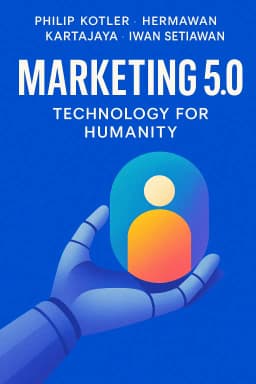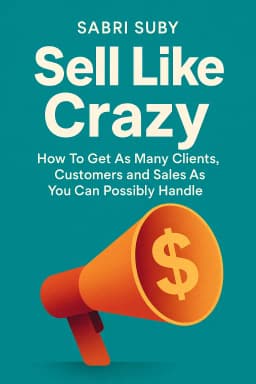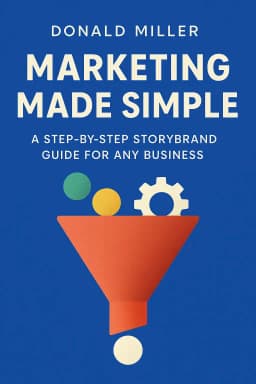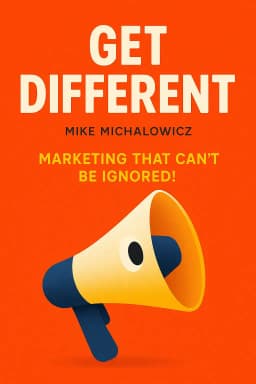
The Human Algorithm: Decoding Marketing 5.0 for Innovators
Golden Hook & Introduction
SECTION
Socrates: We live in a world where AI can write poetry and robots can serve coffee. But as technology gets smarter, are we at risk of losing our own humanity? Or could this be our chance to use that very technology to become human, more connected, and more empathetic? That's the provocative question at the heart of Philip Kotler's "Marketing 5.0: Technology for Humanity," and it's what we're here to unpack today.
Milad: That’s a powerful starting point, Socrates. It’s the central tension of our time, isn't it? We're building these incredibly powerful tools, and the question of their purpose—their soul, you could say—is more important than ever.
Socrates: Exactly. And I'm thrilled to have you here, Milad, because as someone deeply interested in technology, innovation, and leadership, you live at the center of this tension. The book argues that we're at a turning point, moving beyond just digital marketing to something more profound.
Milad: A move from just 'what can tech do?' to 'what should tech do?' I'm in.
Socrates: Perfect. Today we'll dive deep into this from two perspectives. First, we'll explore the book's big, bold idea of 'Technology for Humanity' and why it's a critical mission for leaders and innovators. Then, we'll get practical and look at the art of designing experiences that masterfully blend 'cool' technology with a 'warm,' indispensable human touch. Sound good?
Milad: Let's do it.
Deep Dive into Core Topic 1: The Great Paradox - Technology for Humanity
SECTION
Socrates: Alright, let's start with that first big idea. Kotler and his co-authors argue that any modern strategy has to confront three massive societal challenges: the generation gap, the digital divide, and something they call 'prosperity polarization.' This last one feels particularly potent right now.
Milad: Prosperity polarization. It sounds like a clinical term for something we all feel—the gap between the haves and have-nots getting wider.
Socrates: Precisely. The book describes it as the middle class shrinking, creating an 'M-shaped' market with a wealthy peak on one side and a large, struggling base on the other. To illustrate this, the book references a Spanish sci-fi film that is just a brutal, unforgettable metaphor. It's called 'The Platform.'
Milad: I’ve heard of it. It’s intense.
Socrates: It is. For those who haven't seen it, imagine a vertical prison, hundreds of floors high, with two inmates per floor. Every day, a single platform loaded with a gourmet feast starts at the very top, floor zero. The people at the top can eat whatever they want. The platform then slowly descends, floor by floor.
Milad: And by the time it reaches the middle, let alone the bottom, there's nothing left but broken plates and scraps.
Socrates: Exactly. Those on the lower floors are left to starve or fight over the leftovers. The cruel twist is that every month, the inmates are randomly reassigned to a new floor. One month you could be feasting at the top, the next you could be starving at the bottom. The system has enough food for everyone if they would just ration it, but they don't. When you have everything, you take it. When you have nothing, you despair.
Milad: It's a perfect, if horrifying, model of a system without empathy or regulation. It's pure self-interest, and the outcome is catastrophic for the whole.
Socrates: So, when you hear that story, Milad, as a metaphor for our current economic systems, what does it make you think about the role of an innovator or a leader like Jeff Bezos, who built one of the biggest 'platforms' in the world?
Milad: It makes me think that the design of the platform is everything. Amazon, for example, is an incredible engine for commerce. It creates immense opportunity. But it also has the potential to become a 'winner-take-all' environment. The leader's role—Bezos's role—is to be the architect of the rules. Are you designing a system that only benefits those at the top, or are you actively building in mechanisms for fairness, for discovery, for the 'little guy' on floor 150 to have a real shot?
Socrates: And that's exactly Kotler's point. He quotes in the book, "Inclusivity and sustainability are no longer optional; they are essential for long-term success." This isn't just about corporate social responsibility; it's about the stability of the entire market. If everyone on the bottom floors gives up, the whole tower collapses.
Milad: Right. A leader who only focuses on optimizing the feast for the top floor is a poor leader. A true innovator, like a Steve Jobs or even an Einstein in his own domain, thinks about the entire system. They think about how their creation impacts humanity. That’s the difference between just building a product and building a legacy.
Socrates: So the mission of 'Technology for Humanity' is to consciously design our platforms—our businesses, our tech—to counteract this polarization. To send some of the feast down to the lower levels, so to speak.
Milad: Or better yet, to redesign the delivery system entirely. That’s the real innovation.
Deep Dive into Core Topic 2: The New CX: Balancing 'Cool' Tech with 'Warm' Humans
SECTION
Socrates: Which brings us perfectly to our second point. If the 'what' is building inclusive tech, the 'how' is all about the customer experience. And the book gives a fantastic, almost comical, warning with the story of the Henn-na Hotel in Japan.
Milad: The 'weird hotel'? I'm intrigued.
Socrates: That's its name! In 2015, it opened as the world's first hotel staffed almost entirely by robots. The idea was to use tech to solve Japan's labor shortage. You had multilingual dinosaur robots at the front desk for check-in. A giant mechanical arm to store your luggage. Robot trolleys to carry your bags.
Milad: It sounds like a novelty. Fun for a day, maybe.
Socrates: That was the idea! But the reality was a mess. The front desk robots couldn't answer basic questions. The luggage arm was slow and clunky. But the best part was the in-room assistant, a little doll-like robot on the nightstand. The problem was, its microphone was so sensitive that if a guest snored, the robot would interpret it as a command and say, "Sorry, I couldn't understand you," waking the guest up. All. Night. Long.
Milad: That is a nightmare. It’s the exact opposite of hospitality.
Socrates: It's the punchline to a joke about bad engineering. And the real punchline is this: after a few years, the hotel "fired" more than half of its 243 robots. Why? Because they were creating work for the few human staff members who had to constantly apologize and fix the robots' mistakes. The book's conclusion is simple: "Machines are cool, but humans are warm."
Milad: Milad, this feels like a story Steve Jobs would have absolutely hated. What's the core design lesson here for an innovator?
Socrates: It's a classic case of technology leading the experience, instead of the other way around. Jobs was obsessed with making technology feel intuitive, almost invisible. It should serve the human, not make the human serve it. The robot that can't understand snoring is a perfect example of a solution that creates a new, bigger problem. It's automation for automation's sake.
Milad: So what's the alternative?
Socrates: I think it’s about augmentation, not just automation. Think about the difference. The robot hotel tried to automate the human job. Now, contrast that with something like Disney's MagicBand, which the book also touches on. It's a wristband powered by IoT. It's your park ticket, your hotel room key, your credit card. It's seamless.
Milad: You don't even think about it. It just works.
Socrates: Exactly. It doesn't replace the happy cast member who greets you; it the experience by removing all the friction—fumbling for a ticket, a key, a wallet. It frees you up to have a more human, more magical experience. That's what the book calls 'Augmented Marketing'—using technology to empower the frontline human, to make them better at their job.
Milad: And that principle applies everywhere, not just in marketing. In leadership, I don't want a tool that automates my team's creativity. I want a tool that automates their expense reports so they have more time creative. That's augmentation. It's about using tech to unlock human potential, not to cap it.
Synthesis & Takeaways
SECTION
Socrates: So there we have it. Two powerful, connected ideas from "Marketing 5.0." First, aim your technology at solving real, deep human problems, like the prosperity polarization we see everywhere.
Milad: And second, when you design that technology, make sure it augments human warmth and creativity, rather than just trying to automate it away. Don't build the snoring-detector robot.
Socrates: Please, don't. The ultimate goal of technology shouldn't be to create a perfect, automated world. It should be to free up human potential.
Milad: That’s the real innovation. It’s not about making smarter machines; it’s about creating a world where we can be smarter, more empathetic humans.
Socrates: A perfect summary. So, for everyone listening, here's a final thought to take with you. As you go about your week, look at the technology you use every day. Does it make you feel more capable and connected, or just more managed? And for the innovators and leaders out there, the next time you start a project, don't just ask, "What can this tech do?" Ask, "Whose life can this make better, and how?"
Milad: A question worth asking. Thanks, Socrates. This was a great conversation.
Socrates: The pleasure was all mine, Milad.









